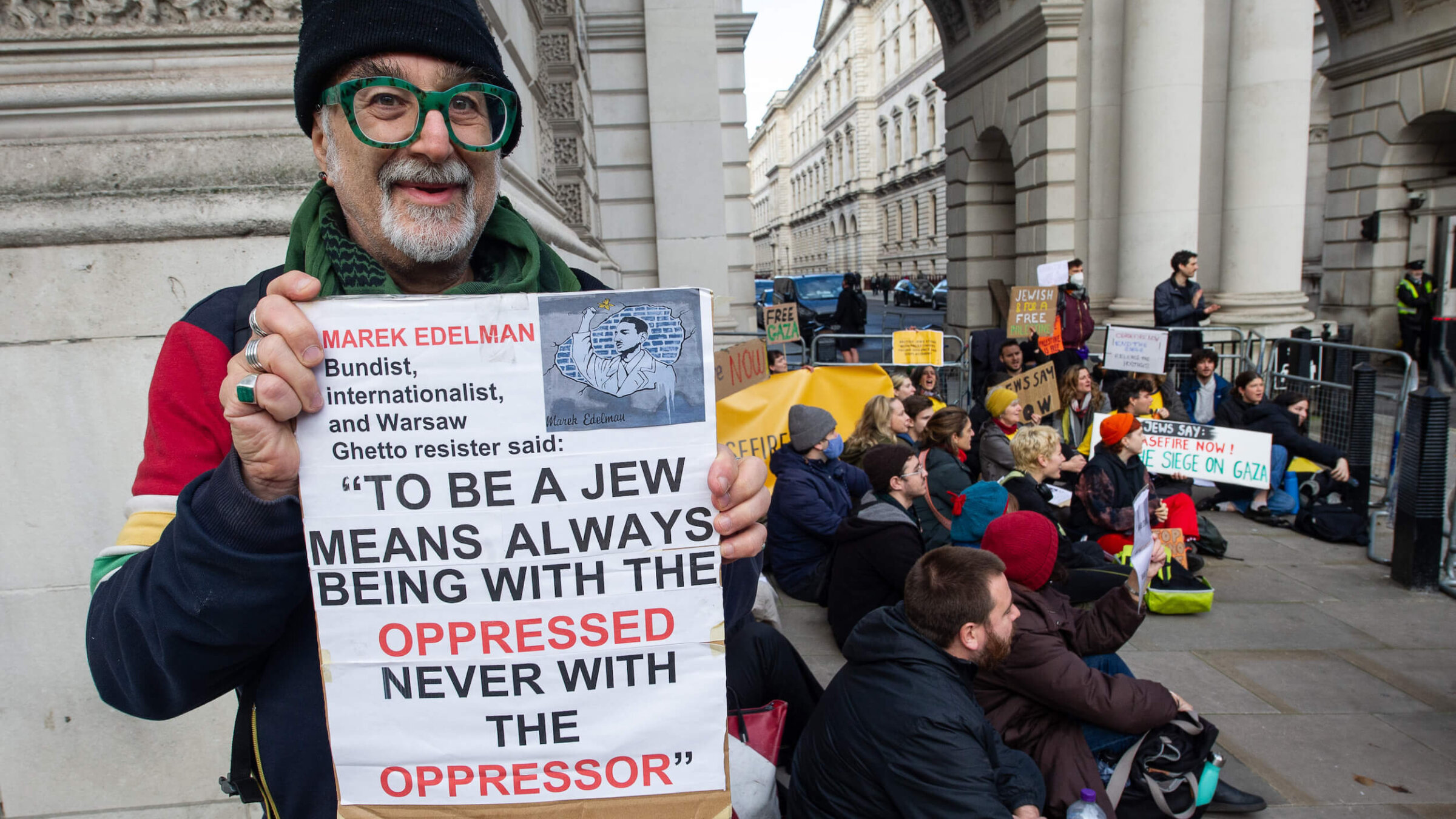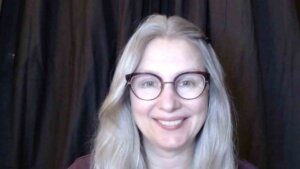Israel’s war is the biggest threat to Jewish peoplehood
A time of crisis is a time to remember the compassion and justice at the heart of Jewish teachings

Activists from Na’amod, an organization of British Jews who oppose Israel’s occupation of the West Bank, blocked walkways into a government building last week to demand a cease-fire in Gaza. Photo by Guy Smallman/Getty Images
Jews have been hit hard over the past month.
First came Hamas’ horrific terrorist attacks on Israel, in which innocent people were murdered, kidnapped, raped and tortured in acts of unspeakable cruelty.
Then came the swift global reaction to Israel’s military response. Legitimate protests broke out around the world, but so did a spate of terrifying antisemitism. Some activists displayed signs depicting the Star of David being dumped into the trash, while others celebrated Hamas’ violence, saying, “Glory to our martyrs.”
But neither Hamas nor antisemitism is the greatest threat to the Jewish people. Rather, it is Israel’s war itself.
The war threatens to destroy us, because when Israel’s leaders commit acts of unconscionable violence in the name of Jewish people, they turn our religion and culture into something merciless and mean. And Israel’s attacks on Gaza are indeed unconscionable. Yes, they are reportedly making headway in destroying Hamas’ infrastructure, but they have also killed more than 10,000 Palestinians so far, according to the Gaza Health Ministry.
Israeli officials’ language suggests that at least some of them consider these deaths negligible, and perhaps even desirable. “We are fighting human animals, and we must act accordingly,” said Defense Minister Yoav Gallant on Oct. 9, making no distinction between Hamas and Palestinian civilians.
We must not let our religion be used this way. We must speak up now and say, “This is not who we are; this is not what Judaism and Jewish identity are.”
Many Jewish people are already doing this. In the United States, groups like IfNotNow and Jewish Voice for Peace have called for a cease-fire, staging powerful demonstrations at the White House, the Capitol building, the Statue of Liberty and Grand Central Station, among others.
And many Israelis — even those who are themselves survivors of Hamas’ attacks or whose loved ones have been killed by Hamas — are also speaking out against the war. Yonatan Zeigen, the son of Vivian Silver, a 74-year-old peace activist thought to be one of the more than 200 hostages held in Gaza, told Nicholas Kristof of The New York Times, “Mother always said we have to shift the paradigm. We won’t have safety in a state of war.”
“How many dead Palestinians will be enough for us to feel safe?” he asked.
If we don’t follow these examples and take action to stop this war, then we allow our traditions and spiritual beliefs to become justifications for murder.
Murder is a strong word. You may say it’s not the right word. But what is the right word to use when Israeli forces repeatedly bomb Gaza’s Jabalya refugee camp? The United Nations Human Rights Office said that those attacks might be considered war crimes, because there was such massive destruction and so many civilian deaths.
Imagine it was you digging through rubble, looking for your loved ones’ bodies. Imagine it was your own children who, as a nurse with Doctors Without Borders said, “arrived at the hospital with deep wounds and severe burns,” with many “screaming and asking for their parents.” And now tell me that our Jewish values can justify such horror.
Already, this violence is being brushed aside with the usual explanations. Speaking on Nov. 1 on behalf of the IDF, Lt. Col. Richard Hecht claimed that fault for Israel’s attacks on the Jabalya refugee camp lay with Hamas, for “hiding, as they do, behind civilians.” Yes, Hamas uses civilians as human shields — a horrifying truth we have encountered many times. But Hamas’ despicable tactics don’t give Israel a pass to kill civilians. International law is clear on this: One party’s war crimes do not justify another’s.
What about our ethical values as Jews? What about tikkun olam? We are charged with repairing the world, not destroying it. Isaac Herzog, the president of Israel, said of Hamas’ Oct. 7 attack that, “It is an entire nation that is responsible. … We will fight until we break their backbone.” This rhetoric should terrify us. If we allow Israel to act on this promise to destroy the Palestinian people, then we do what activist and artist Nomy Lamm calls “moral injury” to ourselves as Jews.
How can we have spiritual peace when a war fought in our names is stealing other people’s lives, hopes and loved ones?
The war will also do physical damage to Jews. It will kill, injure and traumatize Israeli soldiers. Kidnapping victims will likely die, some as a direct result of Israeli airstrikes; Hamas’ armed wing says 60 hostages are already missing as a result of those bombings. Trauma and anger among Palestinian people whose families are killed by Israel will help create new cycles of violence in the future.
Eventually, the world will get tired of Israel’s war in Gaza — much as it got tired of the United States’ unjust wars in Afghanistan and Iraq — and Jews everywhere will be blamed. That process is already underway, with antisemitism surging around the world since the onset of the war. Where antisemitism intensifies, violence inevitably follows, as it has already: A Jewish woman in France was stabbed and a swastika painted on her door just this past weekend.
It’s clear that many Jews are profoundly distressed by the war, and there’s a real risk that they will turn away from Jewish religious practice as a result. Jews who oppose the war won’t want to sit in shul and listen to biblical passages about Jewish people winning wars, taking other people’s land, killing entire populations — especially when they’re read and discussed by spiritual leaders who won’t condemn Israel’s actions in Gaza.
The stage is already set for this alienation, as some leading Jewish organizations have rejected Jews who demonstrate against the war, and have sometimes even claimed that Jews opposed to the war aren’t really Jewish.
Again and again, we are told, “Israel has a right to defend itself.” But killing civilians isn’t self-defense; it’s self-destruction. If we toss aside core Jewish teachings like, “You shall not oppress a stranger, for you know the feelings of the stranger, having yourselves been strangers in the land of Egypt,” then we ruin what’s most valuable about Judaism. We destroy the ethical tradition that binds us together as a people.
“What choice does Israel have?” we are asked. Israel does, in fact, have many choices, but that question is itself part of the problem: Rather than ask what we should do, we must begin with what we should not do. A clear answer to that question is that we should not kill innocent people. If Hamas were embedded in Israeli neighborhoods, the IDF would not be raining bombs on Jewish civilians. We would find other solutions.
As these past few weeks have made abundantly clear, lots of people hate Jews. Many would love to see us die. It is essential that we refuse to help them destroy us. And that is what we will do if we let this war be waged in our names. It will ravage the kindness at the heart of Judaism. And if this happens, we destroy ourselves more thoroughly than Hamas or any other terrorist organization ever could.
The Judaism I love teaches that Jews are the people of the book; that we are the people who leave something in the corners of the fields for the stranger to glean; that we are the people who think, reflect, debate, question before rushing into action. And on one crucial point, our religious tradition is clear: Because we know what it feels like to be hated and persecuted, we must not do this to anyone else.

















